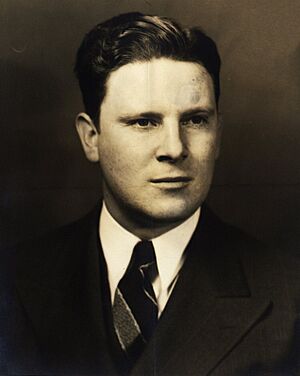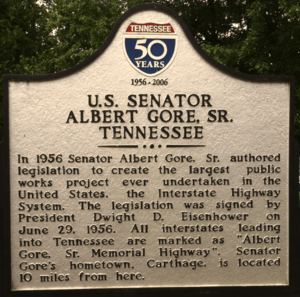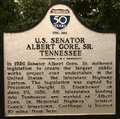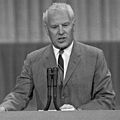Albert Gore Sr. facts for kids
Quick facts for kids
Albert Gore Sr.
|
|
|---|---|
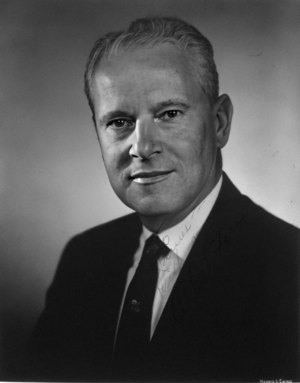
Official portrait, c. 1953
|
|
| United States Senator from Tennessee |
|
| In office January 3, 1953 – January 3, 1971 |
|
| Preceded by | Kenneth McKellar |
| Succeeded by | Bill Brock |
| Member of the U.S. House of Representatives from Tennessee's 4th district |
|
| In office January 3, 1939 – December 4, 1944 |
|
| Preceded by | John R. Mitchell |
| Succeeded by | Himself |
| In office January 3, 1945 – January 3, 1953 |
|
| Preceded by | Himself |
| Succeeded by | Joe L. Evins |
| Personal details | |
| Born |
Albert Arnold Gore
December 26, 1907 Granville, Tennessee, U.S. |
| Died | December 5, 1998 (aged 90) Carthage, Tennessee, U.S. |
| Political party | Democratic |
| Spouse |
Pauline LaFon
(m. 1937) |
| Children |
|
| Alma mater | Middle Tennessee State University (BA) Nashville School of Law (LLB) |
| Military service | |
| Allegiance | |
| Branch/service | |
| Years of service | 1944–1945 |
| Rank | Private |
| Unit | Allied Military Government for Occupied Territories |
| Battles/wars | World War II |
Albert Arnold Gore Sr. (born December 26, 1907 – died December 5, 1998) was an important American politician from Tennessee. He served for many years in the United States Congress. He was a United States Representative from 1939 to 1953 and then a United States Senator from 1953 to 1971. He was a member of the Democratic Party. Albert Gore Sr. was also the father of Al Gore, who later became the 45th Vice President of the United States.
Gore was born in Granville, Tennessee. He went to Middle Tennessee State Teachers College and worked as a teacher. He later became the superintendent of schools for Smith County, Tennessee. He also studied law and became a lawyer. In 1938, he was first elected to the U.S. House of Representatives. He briefly served in the United States Army during World War II to see how soldiers were doing.
In the Senate, Gore helped create the Federal Aid Highway Act of 1956, which built the Interstate Highway System. He also took a stand on civil rights. He supported many of President Lyndon B. Johnson's programs, known as the "Great Society." His opposition to the Vietnam War was a big reason he lost his Senate seat in 1970. After leaving the Senate, he continued to practice law and teach.
Contents
Early Life and Education
Albert Gore Sr. was born in Granville, Tennessee, on December 26, 1907. He was one of five children. His family had lived in Tennessee since after the American Revolutionary War.
He went to Middle Tennessee State Teachers College. After college, he taught school in Overton and Smith Counties from 1926 to 1930. At age 23, he ran for superintendent of schools in Smith County but did not win. However, he was appointed to the job a year later when the person holding the position passed away. Gore also studied law at the Nashville Y.M.C.A. Night Law School, which is now the Nashville School of Law. He finished his law studies in 1936 and became a lawyer.
Political Career
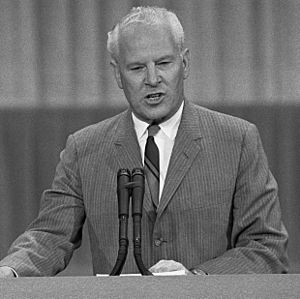
Before joining Congress, Gore worked as the Commissioner of the Tennessee Department of Labor from 1936 to 1937. In 1938, he was elected to the U.S. House of Representatives as a Democrat. He served from January 3, 1939, until he resigned on December 4, 1944, to join the U.S. Army.
Military Service
Gore was one of a few members of Congress who joined the military for a short time. They did this to see firsthand how soldiers were being trained and treated during World War II. He completed basic training and then worked as a prosecutor in Germany for the military government. He served as a private and was discharged in March 1945. This allowed him to return to the U.S. House, as he had been reelected in November 1944. He served in the House again from 1945 until 1953.
Serving in the U.S. Senate
In 1952, Gore ran for the United States Senate and won. He defeated a long-serving senator named Kenneth McKellar. This victory was a big moment in Tennessee politics. During his time as a senator, Gore was very important in creating the laws that led to the Interstate Highway System. This system built major roads across the country.
He was reelected in 1958 and again in 1964. He served in the Senate from January 3, 1953, to January 3, 1971.
Civil Rights and Other Issues
Gore was one of only three Democratic senators from former Confederate states who did not sign the 1956 Southern Manifesto. This document was against racial integration. He voted for the Civil Rights Act of 1957, 1960, and 1968. He also supported the Voting Rights Act of 1965, which helped protect the right to vote for all citizens. He voted to confirm Thurgood Marshall to the U.S. Supreme Court. However, he voted against the Civil Rights Act of 1964.
In 1964, he faced a tough election challenge but still won.
1970 Election and Defeat
By 1970, many people thought Gore might lose his Senate seat. This was because of his views on issues like the Vietnam War, which he was against. The Republican Party was also becoming stronger in Tennessee. He won his party's primary election but then lost the general election to Republican Congressman Bill Brock.
One reason for his defeat was his opposition to the Vietnam War. He also had disagreements with the Nixon administration. Other issues in the election included his vote against allowing prayer in public schools and his opposition to some judges nominated for the U.S. Supreme Court.
His Impact on Politics
In 1956, Albert Gore Sr. became well-known for not supporting the Southern Manifesto, which was against integration. He played a key role in getting the Federal Aid Highway Act of 1956 passed, which created the interstate highways we use today. He also supported President Johnson's "Great Society" programs, which aimed to improve society. He even helped create a plan for Medicare, a health insurance program.
His views on international issues changed over time. He moved from suggesting strong actions during the Korean War to voting for the Partial Nuclear Test Ban Treaty and speaking out against the Vietnam War. These changes in his views likely contributed to him losing his Senate seat in 1970.
Personal Life
On April 17, 1937, Albert Gore Sr. married Pauline LaFon, who was also a lawyer. They had two children: Nancy LaFon Gore (1938–1984) and Albert Gore Jr. (born 1948). His son, Albert Gore Jr., followed in his father's footsteps, becoming a U.S. Representative and Senator for Tennessee. He later served as Vice President of the United States under President Bill Clinton.
After leaving Congress, Albert Gore Sr. continued to work as a lawyer and taught law at Vanderbilt University. He also worked for a company called Occidental Petroleum. He passed away on December 5, 1998, at the age of 90. He lived to see his son become Vice President. He is buried in Smith County Memorial Gardens in Carthage. A part of Interstate 65 in Tennessee is named "The Albert Arnold Gore Sr. Memorial Highway" in his honor.
Images for kids
 | Aaron Henry |
 | T. R. M. Howard |
 | Jesse Jackson |


